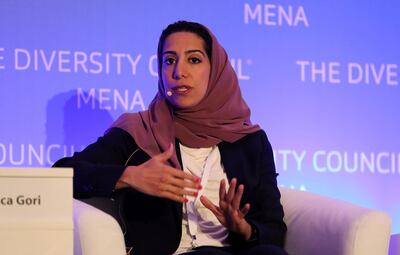The newly established Diversity Council Mena, an accelerator with the goal of advancing more women into leadership positions, held its inaugural meeting in Dubai on Wednesday with initial members that included Accenture, DP World, Bahrain’s GFH Financial Group and the Saudi Industrial Development Fund.
The initiative is led by Tine Willumsen, the chief executive of consultancy Above & Beyond Group in Copenhagen. She founded the Diversity Council in Denmark three years ago with partners such as PwC, McKinsey, Microsoft, container shipping giant Maersk, the Central Bank of Denmark and the Danish Foreign Ministry.
"The timing right now here in the Middle East is really exciting," Ms Willumsen told The National. "The governments are really putting a fast forward - the Saudi Vision 2030 and so on - of actually getting more women into the workplace, advancing them, developing them."
The Saudi Arabian government has set an ambitious target to increase female participation in the workforce to 30 per cent as part of Vision 2030. The percentage of women working in the country has increased from 14.5 per cent in 1990 to 23.3 per cent last year, according to World Bank data.
The UAE, meanwhile, aims to become one of the world’s top 25 countries for gender equality through its Vision 2021 initiative. The UAE Cabinet approved a law last year ensuring men and women receive equal pay and the country’s Gender Balance Council has set several goals, including improving the UAE’s ranking in the United Nations Development Programme’s Gender Inequality Index.
The UAE ranked 46 out of 188 countries last year, scoring 0.232 with zero meaning full equality. In the GCC, it was followed by Bahrain at 48 and Saudi Arabia at 50. The top five countries in the index are Switzerland, Denmark, the Netherlands, Sweden and Norway.
Ms Willumsen announced at the Top CEO conference in Bahrain in April that she would be bringing the Diversity Council to Mena, in partnership with Dubai-based publishing house Mediaquest, and met company executives and government officials in the region to make it happen.
The first Diversity Council Mena meeting was followed by panel discussions on how to boost the GCC economy through increased female participation and leadership in the workplace, how businesses should empower women leaders and how to promote inclusion of women in tech companies.
The panellists included the Danish ambassador to Saudi Arabia; business leaders including du chief executive Osman Sultan; and women executives in the region from Accenture, the GFH Financial Group, the Saudi Industrial Development Fund and General Electric Power.
Noor Shabib is the assistant secretary general of strategic planning and business development at the Saudi Industrial Development Fund, which has a market capital of approximately 105 billion Saudi riyals (Dh103bn). She spoke about how the 45-year-old organisation has been pushing for greater female participation recently.
“Until about two years ago, it was completely male-dominated. Then we started hiring the first woman, then the second and third and then, in the past two years, we've been able to go from zero to 13 per cent,” said Ms Shabib, the first female executive at the fund.
“We’re very happy with where we’re at, but obviously we need to continue to improve,” she added.
Fatema Kamel, executive director of investment management for the GFH Financial Group in Bahrain, said women participation in the public sector has increased in the past five years from 48 to 57 per cent. However, representation in the private sector is still around 35 per cent.
It also remains rare for women to be on company boards in the region, said Ashraf Gamal El Din, the chief executive of Hawkamah Institute for Corporate Governance in Dubai, a supporting partner of the Diversity Council Mena.
“Maybe once every 20 boards, you’ll see one woman on the board,” he said. “Women are everywhere in the government but in the private sector it’s not really happening.”
Mr Sultan said although close to 30 per cent of du’s 2,000 employees are women, there are none on its board or the executive team. He acknowledged changes are needed, starting with cultural transformation.
“Transforming the society is as well about good business,” he said.
Other attending guests included Franz-Michael Mellbin, the Danish ambassador to the UAE.
"We believe that it's good for the government to set goals but the big driver will be what business does," Mr Mellbin told The National.
The Diversity Council focuses on three areas: strengthening the pipeline of female talents; promoting inclusive culture and leadership; and preparing the partner companies to be the preferred workplaces of the future.
Diversity Council Mena members will meet at the chief executive level twice a year and at the human resources level in two annual workshops to discuss challenges and share initiatives to help talented women progress. A second human resources workshop is planned for the autumn and the chief executive committee meeting is scheduled for December.
The “Advanced Leadership Programme for Women” and a one-week fast-track programme for emerging female managers will be offered in the UAE in the first quarter of next year. The leadership programme will take place over a full year with six days of sessions at the Academy at the DIFC and four days at the IE Business School in Madrid, and includes cross-industry mentoring, networking and media training.
The programme mirrors that of the original Danish Diversity Council. The courses, facilitated by Headspring Executive Development, a joint venture of the Financial Times and IE Business School, are taught by professors from London Business School, Insead, IE Business School and the University of Cambridge as well as leadership experts from McKinsey and senior business journalists from the FT.
"This is about keeping your entire talent pool," Ms Willumsen told The National. "If you're open and honest about the challenges, that's when you get the solutions."



